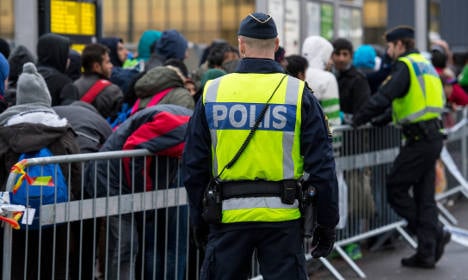Interior minister Anders Ygeman told Sweden’s Dagens Industri newspaper that he believed that at least 60,000, and possibly as many as 80,000, of the 163,000 who sought asylum in Sweden last year would have their applications rejected, meaning they will be returned either to their home countries or to the European country responsible under EU rules.
“The first step will be to go with voluntary return, and to create the best conditions for that,” Ygeman said. “But if that doesn’t work, we will need to have returns backed up by force.”
“I think we will have to see more chartered planes, particularly in the EU-region.”
He said that the Swedish government hoped to strike deals with other EU countries – in particular Germany – over coordinating flights to return asylum seekers.
It is also seeking return agreements with countries such as Afghanistan and Morocco.
But Victor Harju, Ygeman's press secretary, on Thursday told The Local that the headlines were “a bit exaggerated”.
“Due to the fact that we received so many people in Sweden last year, we have to face the reality that more people will also not fulfil the needs within the asylum programme and will not get a permit to stay,” he said.
However, immigration lawyer Terfa Nisébini criticised Ygeman’s plan, saying that by giving an estimate that roughly half of applications would be rejected, telling Expressen newspaper that it risked influencing the way the Swedish Migration Agency assesses cases.
Swedish opposition parties also questioned whether the government would be able to successfully carry out Ygeman's plan.
“No one has managed it before,” tweeted Fredrick Federley, an MEP for Sweden's Centre Party. “Sweden has not succeeded in carrying out deportations for a very long time.”
@nilsgustafsson ingen har klart det innan. Sverige har inte klarat avvisningarna på mkt länge.
— federley (@federley) January 28, 2016
Of the 58,800 asylum requests handled by Swedish migration authorities last year, 55 percent were accepted. Many of those requests were how ever submitted in 2014, before the large migrant flow began.
The Swedish government admits that there is “a significant risk” that large numbers of rejected asylum seekers will attempt to stay without papers, and intends to hire 1,000 additional border police, and deter businesses from employing those who have had their applications refused.
“There need to be severe consequences for those companies which use illegal labour. If there’s a well-developed illegal labour market, that will make the incentive to stay in Sweden stronger,” Ygeman said.
Meanwhile Migration Minister Morgan Johansson said authorities faced a difficult task in deporting such a large number of migrants, but insisted the rejected applicants would have to return home.
“Otherwise we would basically have free immigration and we can't manage that,” he told news agency TT.
However, 7,590 people who had their asylum applications rejected last year went underground, and for the period 2010-2015 their number totalled 40,345, according to the country's migration agency.
READ ALSO: Illegal immigrants disappear 'without trace'
Patrik Engström, head of Sweden’s border police, told Dagens Industri that his officers would from now on be working “much more intensively” on returning rejected applicants.
“We need to work much more closely with the Migration Agency. It’s at the point where people are passed over from the Agency to the police where many disappear. By the time they hear the decision on their claim, police personnel need to already be in place.”


 Please whitelist us to continue reading.
Please whitelist us to continue reading.